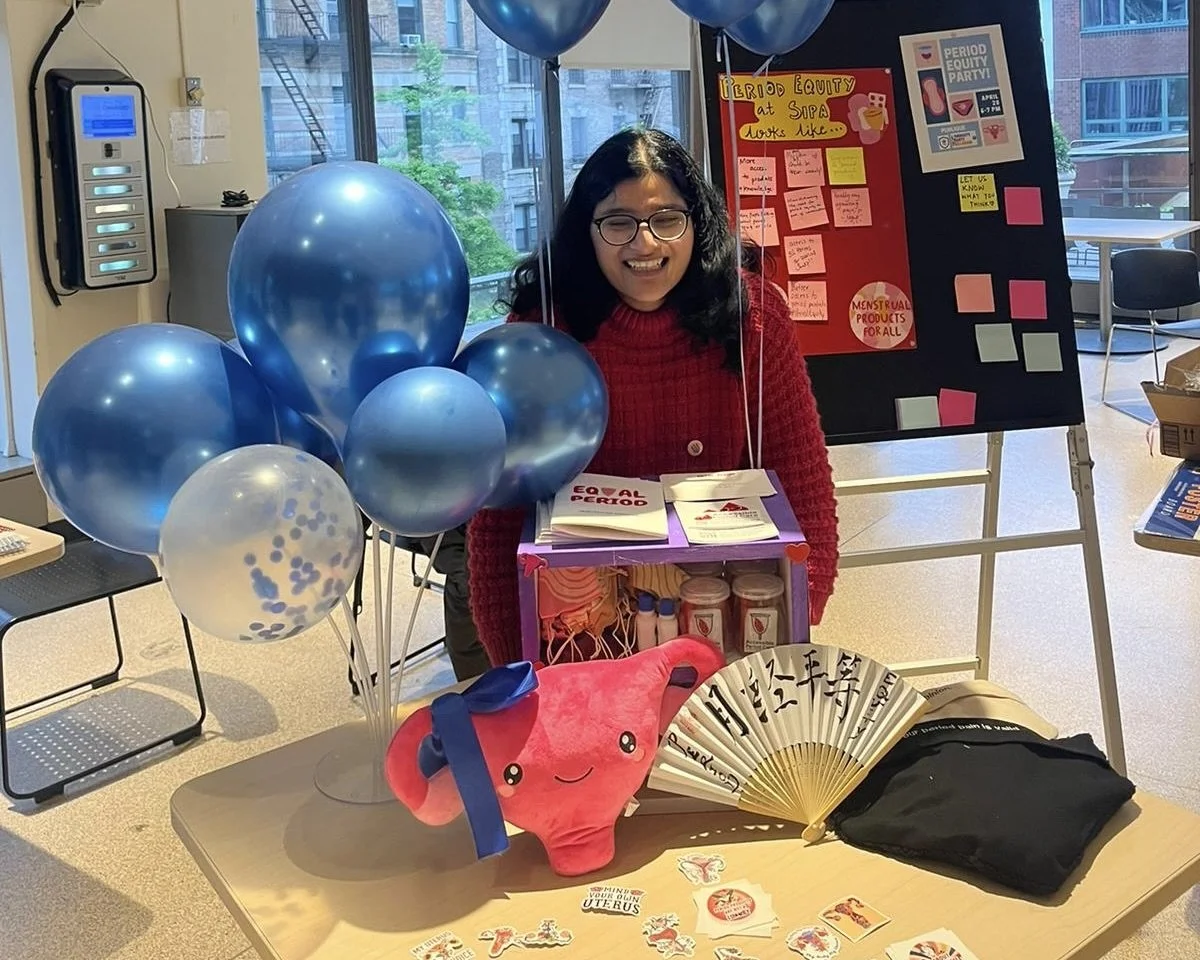CAMPUS NEWS: Student-led project addresses period poverty at SIPA
Aarushi Gupta poses with an array of sustainable period products during the inauguration of the groundbreaking sustainable period product box at Columbia SIPA on April 28. (Photo/Aarushi Gupta)
By Aarushi Gupta
On April 28, I inaugurated a sustainable period product box at Columbia University’s School of International and Public Affairs (SIPA).
The period product box, which will be placed outside of the Office of Student Affairs (OSA), will be equipped with period underwear and menstrual cups in different sizes along with menstrual health education resources.
Currently, the box is supported by more than six menstrual health activists, companies, and similar student-led initiatives across the US that send over monthly product donations.
The overall project to “build period equity” at SIPA also includes heating pads that students can borrow for three to four hours at a time from the OSA reception to assist them in managing period pain.
This project is the result of a year-long research at SIPA wherein I surveyed and interviewed over 200 students about their experiences with periods and related hygiene facilities in IAB.
One of the key findings of my research was that despite Columbia’s focus on sustainability with its campaign called Sustainable Columbia, the lack of institutional support to menstruating students has created an environment that discourages sustainable choices.
Students that use sustainable period products like menstrual cups and period underwear end up not using them while they’re at SIPA because there’s no place to find or wash these products. This means that students have no choice but to use disposable period products that they might not be comfortable with.
What’s worse is that due to rampant period poverty at SIPA, you can’t even find those disposable products easily.
Period poverty is defined as the lack of access to hygienic period products, related disposal facilities, and accurate information about menstrual health. 23% of US students struggle to afford period products in universities, amounting to almost one in 10 students on university campuses.
My survey shows that as many as 75% of students could not find a period product at SIPA when they really needed one and had to resort to using unhygienic agents such as tissues and toilet paper.
The process of looking for a period product at IAB also puts students under immense stress and compromises their academic well-being , as they are forced to miss classes, presentations and key networking events or suffer through period pain and impaired concentration in class.
Period poverty is exacerbated by a culture of stigma and shame around menstruation.
Almost every student I spoke to reported feeling “ashamed” or “embarrassed” at having to ask others for a period product.
The disposal facilities are also malfunctional. The steel bins in IAB washroom stalls are small, and often full of other kinds of waste, which means that students have to carry their used period product to the main tissue bin.
This only serves to exacerbate the embarrassment attached with menstruation for them, making it difficult to have open conversations about periods. As many as 65-80% students stated that they would rather carry their used product with them in their bags or not change their period product at all, rather than go through all this hassle. This puts them at greater risk of developing severe bacterial and vaginal infections.
Furthermore, period poverty disproportionately impacts students of color, disabled menstruators, non-women menstruators, low-income students or students managing menstrual disorders such as polycystic ovarian disease (PCOD) or endometriosis.
A low-income student who wished to remain anonymous told me that they have had to choose between buying food or period products more times than they can count. Furthermore, menstruators managing menstrual disorders may have highly irregular menstrual cycles and blood flow.
Initiatives such as the period product box are a live-saver for them.
It is an honor to kick off Menstrual Hygiene Month with the inauguration of the box. The aim is to not just counter the lack of period products, but also the lack of information and entrenched shame associated with periods: this box is a great way to make accurate menstrual education resources available to students, and to create a safe space for period experience, concerns and complaints to be shared.
In terms of future campaigns for period equity, I have formed a student organization that will manage the period product box and all advocacy initiatives related to menstrual health and reproductive justice at SIPA.
Hopefully, we will also be able to set up period product and disposal bag dispensers in at least four floors at IAB over the summer. It’s a work in progress, but we’re determined to make it happen.
Aarushi Gupta (MIA ‘24) is a menstrual health and reproductive rights activist studying Human Rights Policy who successfully campaigned for free period products in all washrooms at SIPA.

